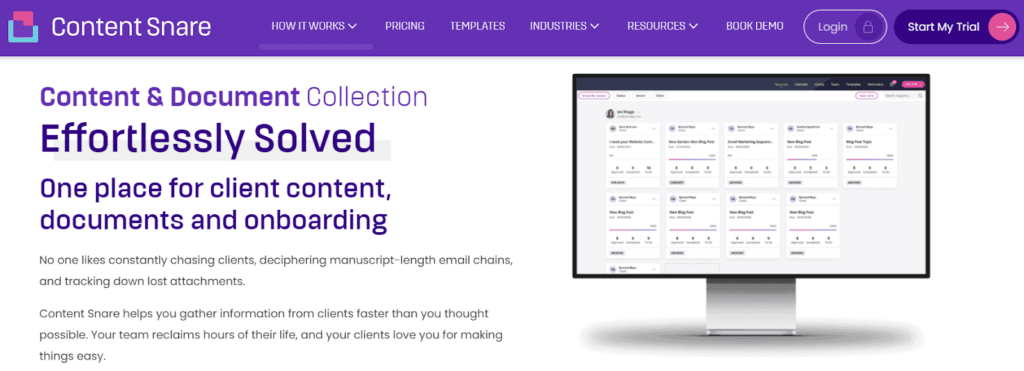Estate planning is a smart move for people who are eager to secure their legacies, but it poses a practical challenge for legal professionals who have to gather a lot of information from clients.
Figuring out the nuances of someone’s financial, familial, and health-related details can be overwhelming, especially if you’re using paper forms or traditional tools such as email to collect data. But the solution is fairly simple — you can create an estate planning questionnaire online.
In this blog post, we'll show you the most important questions to add to your estate planning intake form.
Save time and use our free questionnaire template
Content Snare is a simple tool that helps you collect information, content, and files from clients on time. Send our estate planning intake form to your clients as-is, or customize it as you see fit.
30+ questions to include in your estate planning intake form

Basic information
1. What is your full name?
2. Date of birth
3. Gender
4. Address
5. Email address
6. Phone number
7. Citizenship
Estate planning objectives
8. What are your primary goals for your estate plan? Please specify one or more of the following options:
- Responsible distribution of family wealth
- Minimizing estate taxes to maximize the value of assets passed on to beneficiaries
- Supporting charitable causes
- Developing a plan for the succession of a family business
Marital status
9. Are you married or in a civil partnership? If yes, please specify:
- The start date of marriage/partnership
- Your partner’s name, date of birth, address, and citizenship
10. Have you ever been divorced? If yes, provide details for each divorce:
- The full legal name of the former spouse
- Date of marriage
- Date of divorce
- Any legal agreements or settlements reached during the divorce
Family information
11. Do you have any children (including adopted or step-children)? If yes, please specify for every child:
- Full legal name
- Date of birth
- Contact information (address, phone number, email address)
- Specify if any children are from previous marriages or relationships
12. Provide information on any deceased family members (spouse, children, parents, and siblings). Include full names and dates of birth/death.
13. Do you currently have any strained relationships or disputes within the family? If yes, please specify.
Personal assets

14. Do you own any real estate? If yes, list all properties you own (primary residence, vacation homes, rental properties, and any undeveloped land).
15. Do you have any financial assets? If yes, provide details on bank accounts, savings accounts, certificates of deposit, money market accounts, and other liquid assets.
16. Do you have any investments? If yes, list stocks, bonds, mutual funds, retirement accounts, and any other investment portfolios.
17. Do you have any kind of business ownership? If yes, detail ownership in any businesses, partnerships, or privately-held companies.
18. Do you have any personal property? If yes, list valuable personal items such as jewelry, art, antiques, vehicles, and other significant possessions.
19. Do you own any kind of intellectual property? If yes, specify any patents, trademarks, copyrights, or other intellectual property assets.
20. Do you have a retirement account? If yes, provide information on your retirement savings accounts, including balances and investment details.
21. Do you have any collectibles? If yes, list collections such as stamps, coins, or other valuable collectibles.
22. Do you have any safe deposit boxes? If yes, specify their locations and contents.
23. Do you have any debts and liabilities? If yes, outline any outstanding debts, mortgages, loans, credit card balances, and other financial obligations.
Digital assets and online presence
24. Do you have any online financial accounts? If yes, list your digital banking, investment, or cryptocurrency accounts.
25. Do you own any domain names and websites? If yes, please provide details.
26. Do you have any digital intellectual property such as eBooks, online courses, or digital art? If yes, please specify details.
Power of attorney and living will
27. Have you appointed someone as your financial power of attorney? If yes, provide the individual's full legal name, contact information, effective date, and scope of authority.
28. Have you created a living will? If yes, provide details on your preferences for medical treatments, life-sustaining measures, and end-of-life care.
29. Have you designated a healthcare power of attorney? If yes, provide their full legal name, contact information, and effective date.
30. Do you have any cultural or religious considerations that should guide medical decisions or end-of-life care? If yes, please specify.
31. Is there a provision for revoking the power of attorney? If yes, provide details on the process for each.
Funeral and burial preferences
32. Do you have a preference for burial or cremation?
33. If burial is preferred, specify the type of burial (traditional, green burial, mausoleum, etc.). 34. Indicate any specific cemetery or location where you would like to be laid to rest.
35. Do you have any other burial preferences (e.g. speaker, notification list, or attire)?
36. Provide information for your obituary (e.g. key life milestones or preferred wording).
Additional information
37. Do you have any legal, accounting, and financial advisors? If yes, please specify their names and contact information.
38. What is your preferred frequency for reviewing the estate plan?
Create your questionnaire with Content Snare

The simplest way to create an estate planning intake form is to use an online tool such as Content Snare. Our platform offers a ready-made estate planning template with a comprehensive list of questions, but you are free to start from scratch or customize the template to match your estate planning workflow.
How can you do that?
Firstly, it’s possible to remove or add as many questions as you want. Content Snare features more than 20 field types, from single-line text and file uploads to signatures and choice-based questions.
Another benefit is that you don’t need to send reminders manually — the system will do it automatically based on the schedule of your liking.
You can also guide clients with in-form instructions, helping them understand exactly what you’re looking for. Even if they don’t get it, they can leave a comment for any given question to ask for further elaboration. This feature alone will save you a tremendous amount of time by eliminating endless back-and-forth email threads.
The best thing is that Content Snare takes security very seriously. We use a whole range of security mechanisms to protect your firm and your clients.
Sounds good?



